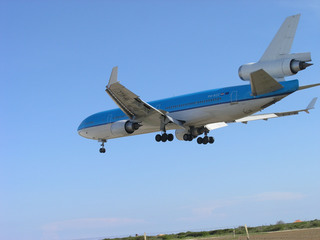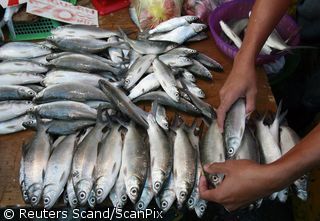It is the only source that can provide a chance for economic breakthrough
Published:
21 March 2005 y., Monday
Money from Russia’s Stabilisation Fund is expected to be invested abroad in dollar-nominated securities, with minimum investment risks and minimum profitability at 2-4%. These funds have until now been kept in Central Bank accounts. This means that a great deal of money will soon appear on the financial markets. On February 1, 2005, the Fund totaled 647.2 billion roubles ($23.1 billion), which mostly came from taxes on oil sales with prices exceeding $20 per barrel and export duties from oil companies.
The crucial question is how this money should be used. Money can only be taken out of the Fund when it has more than 500 billion roubles. Therefore, more than a fifth of its resources can already be used. This is a key issue for Russia’s economy, as the positive overseas market situation in recent years has been almost exclusively responsible for its growth.
However, experts are not tired of repeating that the potential of the resource-oriented Russian economy has been virtually exhausted. The mechanism whereby "we produce oil, sell it and enjoy the benefits" is becoming increasingly less effective. The country is now at a stage when it must introduce an industrial policy. However, any policy only makes sense when there is money to implement it.
Russia’s stock market and banking system do not provide the necessary financing for the real sector of the economy. Direct foreign investment in Russia remains at a very low level, while foreign investment in general is concentrated on either the import of equipment or foreign borrowings. The country obviously needs sources for further growth. The Stabilisation Fund is virtually the only potential source today and a genuine war is being waged for its funds.
Šaltinis:
financialexpress.com
Copying, publishing, announcing any information from the News.lt portal without written permission of News.lt editorial office is prohibited.
The most popular articles
 The European Commission has today decided to close the formal investigation procedure into the agreement between Bratislava Airport in Slovakia and Ryanair after concluding that the airport operator acted as a market economy investor and therefore no advantage has been granted to Ryanair.
more »
The European Commission has today decided to close the formal investigation procedure into the agreement between Bratislava Airport in Slovakia and Ryanair after concluding that the airport operator acted as a market economy investor and therefore no advantage has been granted to Ryanair.
more »
 The coffee industry of Jamaica represents one the largest earners of foreign exchange, approximately US$30 million in 2008.
more »
The coffee industry of Jamaica represents one the largest earners of foreign exchange, approximately US$30 million in 2008.
more »
 On January 13, 2010, the Executive Board of the International Monetary Fund (IMF) concluded the Article IV consultation with Mauritius.
more »
On January 13, 2010, the Executive Board of the International Monetary Fund (IMF) concluded the Article IV consultation with Mauritius.
more »
 The World Bank's International Development Association and the International Monetary Fund have agreed to support US$1.6 billion in debt relief for the Islamic Republic of Afghanistan.
more »
The World Bank's International Development Association and the International Monetary Fund have agreed to support US$1.6 billion in debt relief for the Islamic Republic of Afghanistan.
more »
 The Common Agricultural Policy plays a critical role in helping farmers to deliver environmental goods and services, provided that policies are targeted in the right way.
more »
The Common Agricultural Policy plays a critical role in helping farmers to deliver environmental goods and services, provided that policies are targeted in the right way.
more »
 Regional Policy Commissioner Paweł Samecki will meet Croatia's Prime Minister Jadranka Kosor and members of her government in Zagreb on 25-26 January to discuss the country's preparations for accession in the context of the EU cohesion policy.
more »
Regional Policy Commissioner Paweł Samecki will meet Croatia's Prime Minister Jadranka Kosor and members of her government in Zagreb on 25-26 January to discuss the country's preparations for accession in the context of the EU cohesion policy.
more »
 The World Bank Board of Directors today approved US$20 million for the Dominican Republic in support of the Municipal Development Project, which aims to improve the technical and financial capacity of local governments.
more »
The World Bank Board of Directors today approved US$20 million for the Dominican Republic in support of the Municipal Development Project, which aims to improve the technical and financial capacity of local governments.
more »
 The European Investment Bank (EIB) is lending EUR 400 million to Ford Romania SA for the expansion and refurbishment of the company’s existing car assembly plant located in Craiova in the South-West of Romania.
more »
The European Investment Bank (EIB) is lending EUR 400 million to Ford Romania SA for the expansion and refurbishment of the company’s existing car assembly plant located in Craiova in the South-West of Romania.
more »
 The Agriculture Council of the European Union has examined ways to improve the functioning of the food supply chain with the ultimate aim of controlling the fluctuation in prices and ensuring a more equitative distribution of the added value throughout the chain.
more »
The Agriculture Council of the European Union has examined ways to improve the functioning of the food supply chain with the ultimate aim of controlling the fluctuation in prices and ensuring a more equitative distribution of the added value throughout the chain.
more »
 The European Commission has today approved an application from Lithuania for assistance under the Globalisation Adjustment Fund (EGF).
more »
The European Commission has today approved an application from Lithuania for assistance under the Globalisation Adjustment Fund (EGF).
more »